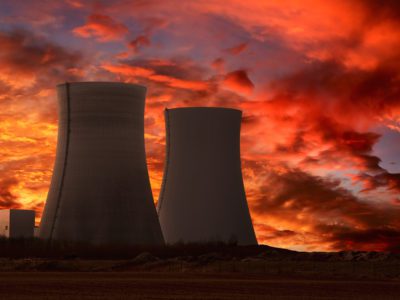BRIAN J GRABER LLC is a nuclear whistleblower lawyer representing nuclear industry employees in Illinois, Indiana, and Michigan who are retaliated against in violation of the federal nuclear whistleblower law. The Energy Reorganization Act, (ERA), 42 U.S.C. 5851 protects certain employees in the nuclear industry from retaliation for reporting violations or potential violations of the Energy Reorganization Act, (ERA), and the Atomic Energy Act, (AEA).
Nuclear Whistleblower Protections
The Energy Reorganization Act, (ERA), whistleblower protection provisions state as follows:
No employer may discharge any employee or otherwise discriminate against any employees with respect to his compensation, terms, conditions, or privileges of employment because the employee (or person acting pursuant to a request of the employee)- (A) notified his employer of an alleged violation of this Act or the Atomic Energy Act of 1954, 42 U.S.C. 2011, et seq.; (B) refused to engage in any practice made unlawful by this Act or the Atomic Energy Act of 1954, if the employer has identified the alleged illegality to the employer; (C) testified before Congress or at any Federal or State proceeding regarding any provision (or proposed provision) of this Act or the Atomic Energy Act of 1954; (D) commenced, caused to be commenced, or is about to commence or cause to commenced a proceeding under this Act or the Atomic Engergy Act of 1954, as amended; (E) testified or is about to testify in any such proceeding; or (F) assisted or participated or is about to assist or participate in any manner in such a proceeding or in any manner in such a proceeding or in any other action to carry out the purposes of this Act or the Atomic Energy Act of 1954, as amended.
Energy Reorganization Act, (ERA), Whistleblower Protection Provision, 42 U.S.C. 5851(a)(1)(A)-(F).
Employers Covered
The nuclear whistleblower protections of the Energy Reorganization Act, (ERA), apply to the following employers:
- A licensee of the Nuclear Regulatory Commission (NRC) or of an agreement State under Section 274 of the Atomic Energy Act of 1954, 42 U.S.C. 2021. See 42 U.S.C. 5851(a)(2)(A).
- An applicant for a license from the Nuclear Regulatory Commission (NRC) or such an agreement State. See 42 U.S.C. 5851(a)(2)(B).
- A contractor or subcontractor of such licensee or applicant. See 42 U.S.C. 5851(a)(2)(C).
- A contractor or subcontractor of the Department of Energy that is indemnified by the Department under Section 170(d) of the Atomic Energy Act of 1954, 42 U.S.C. 2210(d), but such term shall not include any contractor or subcontrator covered by Executive Order No. 12344. See 42 U.S.C. 5851(a)(2)(D).
- A contactor or subcontrator of the Nuclear Regulatory Commission (NRC). See 42 U.S.C. 5851(a)(2)(E).
Nuclear Whistleblower Burden of Proof
Under 29 C.F.R. 24.104(f)(2)(i)-(iv), an employee seeking protection under the Energy Reorganization Act’s Whistleblower Protection Provisions must make a prima facie showing of the following elements:
- The employee engaged in protected activity;
- The employer knew or suspected, actually or constructively, that the employee engaged in protected activity;
- The employee suffered adverse action; and
- The circumstances were sufficient to raise the inference that the protected activity was a contributing factor in the adverse action.
If you believe that you were retaliated against by your employer in violation of the Energy Reorganization Act’s Whistleblower Protection Provisions, contact BRIAN J GRABER LLC, a nuclear whistleblower lawyer at (312) 291-4648 or (574) 395-5189 or (269) 230-6054 or by email to schedule a free confidential consultation.

Protected Activity
A covered employer under the Energy Reorganization Act, (ERA), Whistleblower Protection Provisions cannot discharge or otherwise retaliate against an employee who engages in any of the following protected activities:
- Notified the employer of an alleged violation of the Energy Reorganization Act, (ERA) or the Atomic Energy Act, (AEA);
- Refused to engage in any practice that is unlawful under the ERA or the AEA, if the employee has identified the alleged illegality to the employer;
- Testified before Congress or at any Federal or State proceeding regarding any provision (or proposed provision) of the ERA or AEA;
- Commenced a proceeding, caused a proceeding to be commenced, or are about to commence or cause to be commenced a proceeding under the ERA or the AEA;
- Testified, assisted or participated in, or are about to testify, assist, or participate in a proceeding under the ERA or AEA; or
- Assisted, participated in, or are about to assist or participate in any other action to carry out the purposes of the ERA or the AEA.
If you believe that you were retaliated against by your employer in violation of the Energy Reorganization Act’s Whistleblower Protection Provisions, contact BRIAN J GRABER LLC, a nuclear whistleblower lawyer at (312) 291-4648 or (219) 232-9011 or (269) 230-6054 or by email to schedule a free confidential consultation.
Other federal whistleblower statutes may provide overlapping protections. Click here to learn about the whistleblower protection provisions of the six federal environmental laws. Click here to learn more about federal pipeline whistleblower protections.
Statute of Limitations
The statute of limitations for the Energy Reorganization Act’s Whistleblower Protection Provisions, 42 U.S.C. 5851(b)(1) requires any employee who believes he or she has been discharged or otherwise discriminated against by any person in violation of the Whistleblower Protection Provisions to file an administrative complaint with the U.S. Department of Labor/OSHA within 180 days after the violation occurs. Failure to comply with the 180-day statute of limitations under 42 U.S.C. 5851(b)(1) will likely result in the dismissal of the employee’s nuclear whistleblower claim.
Click here to learn how to file a nuclear whistleblower administrative complaint under the Energy Reorganization Act’s Whistleblower Protection Provisions with the U.S. Department of Labor/OSHA. The time limits for filing a nuclear whistleblower complaint with the U.S. Department of Labor/OSHA are very short. If you believe that you were retaliated against by your employer in violation of the Energy Reorganization Act’s Whistleblower Protection Provisions, contact BRIAN J GRABER LLC, a nuclear whistleblower lawyer at (312) 291-4648 or (219) 232-9011 or (269) 230-6054 or by email to schedule a free confidential consultation.
ERA Kick-Out Provision
The Energy Reorganization Act’s Whistleblower Protection Provisions, 42 U.S.C. 5851(b)(3)(D)(4) permits an employee to file a lawsuit against his or her employer in federal district court if 365 days have passed since the filing of the administrative complaint with the U.S. Department of Labor/OSHA and the U.S. Department of Labor/OSHA has not reached a final decision on the employee’s administrative complaint.
If you believe that you were retaliated against by your employer in violation of the Energy Reorganization Act’s Whistleblower Protection Provisions, contact BRIAN J GRABER LLC, a nuclear whistleblower lawyer at (312) 291-4648 or (219) 232-9011 or (269) 230-6054 or by email to schedule a free confidential consultation.

Whistleblower Remedies
If an employee is successful on his or her whistleblower protection complaint, the U.S. Department of Labor or a federal district court may order any of the following remedies that are supported by the evidence:
- Affirmative action to abate any violation;
- Reinstatement of the employee to his or her former position with backpay and compensation for lost benefits;
- Compensatory damages;
- Litigation expenses;
- Expert witness fees; and
- Reasonable attorney’s fees.
If you believe that you were retaliated against by your employer in violation of the Energy Reorganization Act’s Whistleblower Protection Provisions, contact BRIAN J GRABER LLC, a nuclear whistleblower lawyer at (312) 291-4648 or (219) 232-9011 or (269) 230-6054 or by email to schedule a free confidential consultation.
